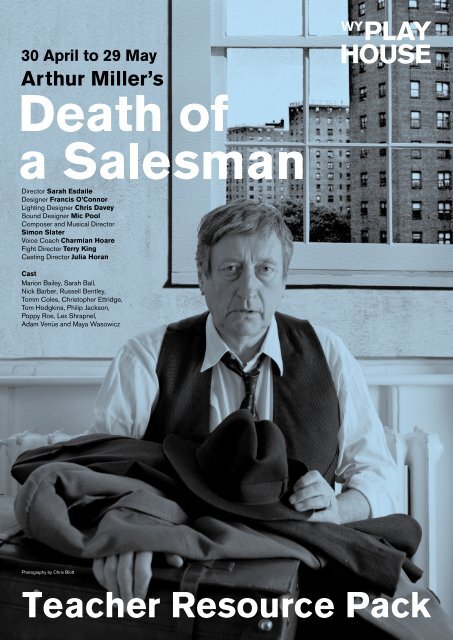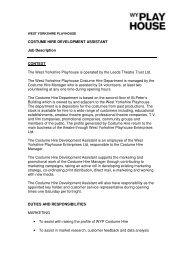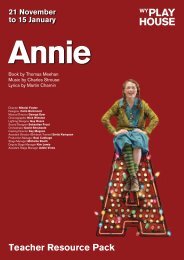Death of a Salesman - West Yorkshire Playhouse
Death of a Salesman - West Yorkshire Playhouse
Death of a Salesman - West Yorkshire Playhouse
Create successful ePaper yourself
Turn your PDF publications into a flip-book with our unique Google optimized e-Paper software.
30 April to 29 May<br />
Arthur Miller’s<br />
Director Sarah Esdaile<br />
Designer Francis O’Connor<br />
Lighting Designer Chris Davey<br />
Sound Designer Mic Pool<br />
Composer and Musical Director<br />
Simon Slater<br />
Voice Coach Charmian Hoare<br />
Fight Director Terry King<br />
Casting Director Julia Horan<br />
Cast<br />
Marion Bailey, Sarah Ball,<br />
Nick Barber, Russell Bentley,<br />
Tomm Coles, Christopher Ettridge,<br />
Tom Hodgkins, Philip Jackson,<br />
Poppy Roe, Lex Shrapnel,<br />
Adam Venus and Maya Wasowicz<br />
Photography by Chris Blott<br />
Teacher Resource Pack
Introduction<br />
<strong>Death</strong> <strong>of</strong> a <strong>Salesman</strong> is widely considered as one <strong>of</strong> the greatest plays <strong>of</strong> the 20th Century. It was<br />
pioneering in form and structure and fiercely critical <strong>of</strong> the society ideals in which it existed. It won the<br />
Pulitzer Prize in 1949 and still has a startling relevancy over sixty years after its premiere.<br />
Arthur Miller is the reason that I do what I do. His writing has a scope and a passion that moves me<br />
like no other playwright. His plays fuse the personal and political in a way that makes us both weep<br />
for his characters and inspires us to fight to change a world in which they are left with no other<br />
choices.<br />
<strong>Salesman</strong> is widely considered to be the greatest <strong>of</strong> Miller’s plays and one <strong>of</strong> the most important<br />
<strong>of</strong> the Twentieth century. Miller described <strong>Salesman</strong> as a love affair between a father and son and<br />
between them both and America. Willy Loman is a man who pursues his vision <strong>of</strong> a better life to the<br />
bitter end because insignificance is more frightening to him than death and because being “a dime a<br />
dozen” is simply not an option in a society that worships money and success.<br />
If you are coming to the play fresh, I urge you to make the trip to the <strong>Playhouse</strong> and see what all the<br />
fuss is about; if you have read or studied it, I urge you to give yourself the unforgettable experience<br />
<strong>of</strong> watching it on stage; and finally, if you have seen it many times before, come to <strong>West</strong> <strong>Yorkshire</strong><br />
<strong>Playhouse</strong> to see what this extraordinary cast and creative team can do to enrich your relationship<br />
with the play. Whatever you know or don’t know about the play already, I feel confident that you will<br />
have an electrifying encounter with Arthur Miller and his harrowing yet uplifting masterpiece.<br />
Sarah Esdaile<br />
Director <strong>of</strong> <strong>Death</strong> <strong>of</strong> a <strong>Salesman</strong><br />
Creative Education at <strong>West</strong> <strong>Yorkshire</strong> <strong>Playhouse</strong> is <strong>of</strong>fering a whole host <strong>of</strong> activities in connection with<br />
our production <strong>of</strong> <strong>Death</strong> <strong>of</strong> a <strong>Salesman</strong>. To find out more please contact Jessica Farmer on<br />
0113 213 7800 or jessica.farmer@wyp.org.uk.<br />
Encounter – 11 May, 5.30pm-6.15pm<br />
£3 per student<br />
Pre-show question and answer session with the company<br />
Theatre Days – 13 (Sold Out), 20 and 27 April<br />
£19.50 per student to include matinee performance ticket<br />
A practical insight into the making <strong>of</strong> this production.<br />
In-school Workshops, By arrangement<br />
£160 for a group <strong>of</strong> up to 30 students<br />
Pre or post show workshops in your school focusing on this production.<br />
<strong>West</strong> <strong>Yorkshire</strong> <strong>Playhouse</strong> / <strong>Death</strong> <strong>of</strong> a <strong>Salesman</strong> / Resource Pack
Synopsis<br />
The play begins with Willy Loman returning to his<br />
Brooklyn home late one evening from his work as<br />
a travelling salesman. His wife Linda greets him<br />
and finds him exhausted. Linda suggests he talk to<br />
his boss Howard Wagner about getting a position<br />
in New York so that he would no longer have to<br />
travel so far.<br />
Meanwhile Biff and Happy, Willy’s grown-up sons<br />
who are staying with Linda and Willy, have woken.<br />
During the conversation that follows it is revealed<br />
that neither <strong>of</strong> the boys is content – Biff is struggling<br />
with his father’s view <strong>of</strong> him as a failure and although<br />
Happy is seemingly success-ful he is lonely. They<br />
dream about setting up a business together and<br />
resolve that Biff will make an appointment to see<br />
Bill Oliver, a businessman for whom Biff once<br />
worked, and ask for a loan.<br />
Exhausted, Willy reminisces about the boys when<br />
they were younger. As he slips from present to<br />
past we see Willy’s hopes for himself and his<br />
family and the view that to be successful you need<br />
be well-liked and attractive.<br />
Charley, the Loman’s neighbour has heard the<br />
commotion <strong>of</strong> Willy returning home and comes<br />
over. He <strong>of</strong>fers Willy a job but Willy is too proud to take it. Through his conversation with Charley we learn<br />
that Willy’s brother Ben has recently passed away and he appears to Willy during the scene, taunting him<br />
with tales <strong>of</strong> the wealth he has acquired.<br />
Linda confides in Biff and Happy that there is something seriously wrong with Willy and that his<br />
disappointment in his sons is causing him great pain. She begs them to help him. By the end <strong>of</strong> the<br />
evening, the boys have told Willy <strong>of</strong> their idea <strong>of</strong> setting up business together and Biff plans to go and<br />
see Bill Oliver the following day. Willy resolves to talk to Howard Wagner about getting a position in New<br />
York. They arrange to meet at Stanley’s Chop House following their meetings.<br />
<strong>West</strong> <strong>Yorkshire</strong> <strong>Playhouse</strong> / <strong>Death</strong> <strong>of</strong> a <strong>Salesman</strong> / Resource Pack
Synopsis<br />
The following morning the house is full <strong>of</strong> expectation. Unfortunately Willy’s meeting with Howard does<br />
not go well and the meeting ends with Howard firing him. Following this he visits Charley at his <strong>of</strong>fice<br />
and runs into Bernard, Charley’s son, who has become a successful lawyer, causing Willy’s further<br />
disappointment in his own son, Biff. Bernard tells Willy that Biff changed following a visit to see his father<br />
in Boston which angers Willy. Charley again <strong>of</strong>fers Willy a job and again Willy turns it down. Charley<br />
loans Willy the money to pay his insurance.<br />
Meanwhile Biff’s meeting with Bill Oliver has also gone badly. Oliver kept Biff waiting all day and then<br />
hardly remembered who he was. This compounds Biff’s view <strong>of</strong> himself as a failure. He resolves to clear<br />
the air with his father once and for all. The subsequent meeting at Stanley’s Chop House does not go<br />
well, ending with Biff walking out, leaving Happy to look after Willy. Happy, however, is distracted by two<br />
girls, Lotta and Miss Forsythe, and rejects Willy, leaving with the girls.<br />
Willy retreats into the past and through his memory it is revealed that the source <strong>of</strong> tension between he<br />
and Biff stems from Biff’s discovery <strong>of</strong> one <strong>of</strong> his father’s affairs in Boston.<br />
Later that evening Linda is very angry with Biff and Happy for walking out on Willy and a huge argument<br />
ensues. Biff breaks down. Willy leaves the house and we hear the sound <strong>of</strong> his car speeding away.<br />
The requiem is the final scene <strong>of</strong> the play and we see Biff, Linda, Happy and Charley at Willy’s graveside.<br />
Linda is left alone to say goodbye.<br />
<strong>West</strong> <strong>Yorkshire</strong> <strong>Playhouse</strong> / <strong>Death</strong> <strong>of</strong> a <strong>Salesman</strong> / Resource Pack
Characters<br />
Willy Loman<br />
The salesman <strong>of</strong> the story, Willy Loman believes<br />
that to get on in life you need be well liked and<br />
attractive. Willy has spent his life aspiring to live<br />
the American dream. Now at sixty-one years old<br />
Willy is unable to reconcile the reality that he<br />
cannot achieve this success and wealth.<br />
Linda Loman<br />
Willy’s long-suffering wife who is the strength <strong>of</strong><br />
the family, attempting to balance the fragile fatherson<br />
relationships. Linda is supportive, loyal and<br />
wants to believe in Willy and his dreams but she is<br />
also realistic and desperately wants to find a way<br />
to help her husband.<br />
Biff Loman<br />
Willy’s eldest son. Biff was a high school football<br />
star and Willy has ever since had huge expectations<br />
<strong>of</strong> him. Biff, however, has never been able to hold<br />
down a job in the city and his instincts tell him to<br />
abandon Willy’s dream and head <strong>West</strong> to work on<br />
the land. This conflict between father and son<br />
cannot be reconciled.<br />
Happy Loman<br />
Willy’s younger son who has lived in Biff’s shadow<br />
all his life. Much like his father, Happy is in the<br />
pursuit <strong>of</strong> success, wealth and women. Happy<br />
tries to persuade Biff to play along with Willy’s<br />
fantasies <strong>of</strong> success.<br />
Bernard<br />
The son <strong>of</strong> the Loman’s next door neighbour<br />
Charley, Bernard has always idolised Biff. Having<br />
always studied hard, Bernard is now a successful<br />
lawyer. Willy has derided Bernard in the past for<br />
not being “well-liked” and he now finds his<br />
success difficult to deal with.<br />
Charley<br />
The Lomans’ next door neighbour and Bernard’s<br />
father. Charley is wealthy and supports Willy by<br />
giving him money to help pay his bills, even<br />
<strong>of</strong>fering him a job. Willy always believed he could<br />
be more successful than Charley and is now<br />
jealous <strong>of</strong> his success.<br />
Ben<br />
Willy’s successful and wealthy older brother Ben<br />
has recently died and he appears to Willy in<br />
dream-like moments. Ben is the ultimate in<br />
success for Willy and adds to his feeling <strong>of</strong><br />
inadequacy.<br />
Howard Wagner<br />
Howard is Willy’s boss. He has taken over from<br />
his father and has taken Willy <strong>of</strong>f salary and onto<br />
straight commission. Howard is condescending<br />
towards Willy and sees him as insignificant.<br />
The Woman<br />
A woman with whom Willy had an affair. When Biff<br />
discovers his father’s affair his view <strong>of</strong> him changes.<br />
Stanley<br />
A waiter at Frank’s Chop House where Willy is to<br />
meet with his sons to celebrate their hoped-for<br />
success.<br />
Miss Forsythe and Letta<br />
Two women at Frank’s Chop House. Their<br />
presence distracts the Biff and Happy in their<br />
meeting with Willy.<br />
Jenny<br />
Secretary to Charley, Willy’s next door neighbour.<br />
<strong>West</strong> <strong>Yorkshire</strong> <strong>Playhouse</strong> / <strong>Death</strong> <strong>of</strong> a <strong>Salesman</strong> / Resource Pack
Interview<br />
Sarah Esdaile – Director<br />
How did you discover Arthur Miller<br />
The first play <strong>of</strong> Arthur Miller’s that I studied was The Crucible at school and after that I read everything<br />
else – plays, biographies and fiction – anything <strong>of</strong> Miller’s that I could get my hands on. I realised that<br />
more than Shakespeare, more than any other playwright, these were the plays for me. The stories and the<br />
characters moved me. Miller fuses the personal and the political more successfully that any other writer.<br />
Audiences don’t feel that they are preached at, rather they are witnessing intimate stories, and these<br />
stories operate on many levels.<br />
Why <strong>Death</strong> <strong>of</strong> a <strong>Salesman</strong><br />
It’s a great, great play and beautifully crafted. And plays like this are never not relevant. The subtitle <strong>of</strong> the<br />
play is interesting “Certain private conversations in two acts and a requiem” and as an audience watching<br />
the play you do <strong>of</strong>ten feel that these are conversations that you shouldn’t be listening to. This play moves<br />
people because audiences can identify with what the play is fundamentally about – a man’s desire to be<br />
successful and the painful reality when he realises that these aspirations cannot be achieved. The writing<br />
is sophisticated and complex. Many commentators make sweeping statements that <strong>Death</strong> <strong>of</strong> a <strong>Salesman</strong><br />
is a protest against the capitalist philosophies <strong>of</strong> the American Dream but actually the most stable<br />
character in the play is Charlie who is a capitalist. Ultimately, according to Miller, the play is a love affair<br />
between father and son and them both with America. It’s about the impact <strong>of</strong> expectation on the Loman<br />
family and how Willy’s expectations, which have been constructed by society, lead to his downfall.<br />
What will this production bring to the play<br />
I feel very humble in directing this play and I trust in Miller’s writing. I am particularly interested in<br />
exploring Willy’s cruelties, his affair and the merging <strong>of</strong> his past and present. Miller once said that there<br />
are no flashbacks in this play, that for Willy it is all part <strong>of</strong> his present. What we see on stage are Willy’s<br />
memories which he prefers to his present and I’m interested in the subjectivity <strong>of</strong> these memories – we<br />
don’t know the truth, all we have is the past as Willy sees it.<br />
On the design side this production will contain projections so video will be interspersed throughout. Of<br />
course, any new team <strong>of</strong> creatives and actors coming together will bring something to a piece and we are<br />
discovering new elements in the rehearsal room.<br />
How are rehearsals going<br />
We are working chronologically through the play.<br />
In order to create an ensemble I have undertaken<br />
a lot <strong>of</strong> character work with the actors. In terms<br />
<strong>of</strong> character stage-time, this play is rather<br />
unbalanced – there are some characters who just<br />
appear for one scene. However, we have done<br />
detailed work with all the actors in really exploring<br />
their characters. We have split the text into units<br />
and rehearse in these chunks – systematically<br />
working through for a first draft. I think it’s<br />
important for the company to get all the way<br />
<strong>West</strong> <strong>Yorkshire</strong> <strong>Playhouse</strong> / <strong>Death</strong> <strong>of</strong> a <strong>Salesman</strong> / Resource Pack
Interview<br />
Sarah Esdaile – continued<br />
through the piece as this will help the understanding <strong>of</strong> the characters and the play and then for us to go<br />
back and work through in more detail.<br />
How will this production touch the audience<br />
I hope that the production moves the audience. I feel a great deal <strong>of</strong> responsibility for this piece in that<br />
my role is to act as a conduit for the playwright and audience. I am also very aware that many people<br />
seeing this production will be seeing it for the first time, many <strong>of</strong> them students who are reading the play<br />
in school, and I feel an incredible responsibility in bringing it to life. Audiences will receive the story in<br />
different ways - some on a personal level and others on an intensely political level.<br />
The play is complex and was pioneering in structure when it was written and I hope to enable the<br />
audience to be fully engaged with what is in Willy’s past and present. The intended focus in the play is<br />
not on minute-to-minute action. The how is the focus not the what. Willy’s death is inevitable.<br />
<strong>West</strong> <strong>Yorkshire</strong> <strong>Playhouse</strong> / <strong>Death</strong> <strong>of</strong> a <strong>Salesman</strong> / Resource Pack
Interview<br />
Marion Bailey: Linda Loman<br />
How are rehearsals going<br />
Very well. We’re working long days and it’s very<br />
emotional but in a good way. The process has been<br />
to undertake a lot <strong>of</strong> text and character work in the<br />
beginning. We were given a lot <strong>of</strong> homework! The<br />
primary tool for us in discovering our characters<br />
has been to look at the text and in particular what<br />
the character says about themselves, what other<br />
characters say about them and what they say about<br />
others. Sarah (Esdaile, director) asked us to create<br />
a biography for our character using words from the<br />
text. We also looked at other elements that would<br />
tell us something about the character such as a<br />
colour that represents the character, an object that<br />
is special to them, an animal that represents them<br />
and the character’s favourite piece <strong>of</strong> music. We<br />
shared these ideas with the rest <strong>of</strong> the company.<br />
In the first few weeks <strong>of</strong> rehearsal I was the only<br />
female actor so it was interesting hearing the male<br />
take on Linda. I am discovering new elements <strong>of</strong><br />
Linda everyday and I’m getting to know her.<br />
What makes <strong>Death</strong> <strong>of</strong> a <strong>Salesman</strong> a great<br />
play<br />
We have been discussing in rehearsal how<br />
influenced Arthur Miller was by Greek tragedy and how this play has an epic, dance-like feel. <strong>Death</strong> <strong>of</strong> a<br />
<strong>Salesman</strong> works on a visceral level, it is poetic and beautifully written but it would work without the words.<br />
It doesn’t just engage the brain but the heart and the gut too. It is a politically sharp piece but the personal<br />
story <strong>of</strong> the unintentional destruction <strong>of</strong> the Loman family because <strong>of</strong> their inability to face reality is incredibly<br />
engaging.<br />
What does Linda want most in the world<br />
In her thirties Linda wants domestic happiness - a happy family life with all <strong>of</strong> the American accoutrements.<br />
She pr<strong>of</strong>oundly loves Willy. Later, the point at which we meet Linda in the play, she desperately wants to<br />
hold onto that dream and to Willy. It’s interesting that she talks very little about herself in the play, it’s always<br />
about others and by the end, it’s all about Willy and his survival and happiness.<br />
What does Linda think is Willy’s best quality<br />
Willy’s best qualities are his sense <strong>of</strong> fun, his masculinity, his desire to look after them all and his dreams<br />
and aspirations. Later she does still see these qualities but she also sees what she perceives to be his<br />
exhaustion and the breakdown <strong>of</strong> his relationship with Biff. She thinks that if she can reconcile Biff and<br />
Willy, life will change. Linda hopes she can heal Willy.<br />
<strong>West</strong> <strong>Yorkshire</strong> <strong>Playhouse</strong> / <strong>Death</strong> <strong>of</strong> a <strong>Salesman</strong> / Resource Pack
Interview<br />
Marion Bailey – continued<br />
Linda sees her role in life as being a good wife to Willy. She is very good at budgeting and running the<br />
home and she handles her husband well. She knows Willy and his weaknesses as well as his strengths,<br />
his exaggerations, the fact that he is economical with the truth. I believe that she also knows about his<br />
women and about Boston but she dare not open that box. She knows that Willy loves her and she is right.<br />
What excites you about this production<br />
The scope <strong>of</strong> it, that it moves from the prosaic to the epic, from joyous domesticity to despair. It is not a<br />
naturalistic play and was pioneering in form when it was written.<br />
I am enjoying playing a strong woman. When Sarah asked us to choose an animal to represent the<br />
character I chose a lioness. Miller is sometimes criticised for weak women in his plays but I see Linda as<br />
the backbone <strong>of</strong> the Loman family. When she defers to Willy it’s because she chooses to let Willy have<br />
his way.<br />
What is the challenging about this production<br />
The greatest challenge I feel is doing justice to Arthur Miller’s great play.<br />
How would you like the play to touch the audience<br />
I would like the audience to be moved by the play, and to enjoy it. I hope that the audience will hear the<br />
language, see the physicality and experience the power <strong>of</strong> the play.<br />
<strong>West</strong> <strong>Yorkshire</strong> <strong>Playhouse</strong> / <strong>Death</strong> <strong>of</strong> a <strong>Salesman</strong> / Resource Pack
Interview<br />
Nick Barber: Happy Loman<br />
What makes <strong>Death</strong> <strong>of</strong> a <strong>Salesman</strong> a great<br />
play<br />
A couple <strong>of</strong> things strike me. One is the relationships<br />
within the play. It is about family, the dynamics<br />
within that family and how they shift. This element<br />
is very truthful and everyone can relate to this<br />
portrayal <strong>of</strong> the family. The other thing is that Miller<br />
is not afraid to take the audience on a journey into<br />
a dark place. We have been discussing in rehearsals<br />
how the play has elements <strong>of</strong> Greek tragedy. It is<br />
cathartic in the sense that it takes the audience<br />
on this journey and brings them through it. The<br />
audience know what will happen to Willy from the<br />
start <strong>of</strong> the play but it’s not about what happens<br />
it’s about how it happens.<br />
How would you describe Happy<br />
Happy is happy go lucky but not very emotionally<br />
intelligent. He would rather everyone had a nice<br />
time than approach their problems. He’s papering<br />
over the cracks. He’s also a misogynist and sees<br />
women either as whores or as paragons <strong>of</strong> virtue<br />
which is how he sees his mother. Other women<br />
he sees as objects. He is much like Willy in that<br />
he has no sense <strong>of</strong> self and what he really wants<br />
from life. He thinks he wants women, cars and a nice apartment but this doesn’t seem to have made him<br />
content. He embodies Willy’s sense <strong>of</strong> self importance and ambition. He could turn into Willy.<br />
What excites you about this play<br />
I’m loving being back at <strong>West</strong> <strong>Yorkshire</strong> <strong>Playhouse</strong>. I was here last year with His Dark Materials which was<br />
co-directed by Sarah Esdaile. It’s great to work with Sarah again and a fantastic company. It is a very<br />
strong group <strong>of</strong> actors and we are discovering so much together about the play.<br />
What are the greatest challenges for you as an actor in this play<br />
Technically the accent is quite a challenge. It’s a very specific accent – it’s New York-Brooklyn but not<br />
gangster. It’s important to get this right.<br />
One <strong>of</strong> the greatest performances is the emotional trajectory for the characters. When we are rehearsing<br />
single scenes at a time it’s a challenge to feel the weight <strong>of</strong> the story that has come before a particular<br />
scene. This <strong>of</strong> course will become clearer when we start to run through the play as a whole.<br />
<strong>West</strong> <strong>Yorkshire</strong> <strong>Playhouse</strong> / <strong>Death</strong> <strong>of</strong> a <strong>Salesman</strong> / Resource Pack
Interview<br />
Nick Barber: Happy Loman – continued<br />
What do you think Happy believes to be Biff’s greatest flaw<br />
Happy thinks Biff’s greatest flaw is that he doesn’t seem to want to do anything with his life, which is also<br />
what Willy thinks. Happy loves Biff and looks up to him but he cannot understand his seeming disinterest<br />
in success.<br />
What is the definition <strong>of</strong> success for Happy<br />
The definition <strong>of</strong> success for Happy is having lots <strong>of</strong> money, business colleagues who admire him,<br />
women falling at his feet and a flash apartment. At the end <strong>of</strong> the play I think he becomes even more<br />
determined to achieve this. At the start <strong>of</strong> the play he does appear to have some <strong>of</strong> this but we learn that<br />
in reality he is pretty low down the pecking order in the firm and the death <strong>of</strong> his father gives him more<br />
<strong>of</strong> an impetus to want to move up. However, Happy lacks drive and entrepreneurial intuition, just as Willy<br />
does and this is a source <strong>of</strong> major conflict within him.<br />
<strong>West</strong> <strong>Yorkshire</strong> <strong>Playhouse</strong> / <strong>Death</strong> <strong>of</strong> a <strong>Salesman</strong> / Resource Pack
Rehearsal Diary<br />
Elle While – Assistant Director<br />
Rehearsal Room One at <strong>West</strong> <strong>Yorkshire</strong> <strong>Playhouse</strong> has been a hub <strong>of</strong> creativity, exploration and discovery<br />
over the past four weeks.<br />
Rehearsals began with detailed text and character work. Each actor studied the text rigorously to gather<br />
information about their character. This included making lists <strong>of</strong> everything that their character says about<br />
themselves and others in the play and everything that is said about their character. In order to build fully<br />
rounded characters the actors also created a history. This was a combination <strong>of</strong> facts about the character<br />
from the play and an imaginary history.<br />
The text work undertaken by the company was fundamental in giving the actors a solid foundation to their<br />
work. The pioneering style which Miller used in <strong>Death</strong> <strong>of</strong> a <strong>Salesman</strong> means that it can be initially confusing<br />
as to where and when each scene is taking place. Creating a timeline for the scenes set in the present<br />
(1949) and working out the order <strong>of</strong> Willy’s memories (1932) helped us to clarify the journey <strong>of</strong> the play<br />
to ourselves, and therefore to our audiences. Research was also undertaken to ensure that the company<br />
understood every reference in the play which is particular to the period or to America.<br />
16/4/10<br />
Charmian Hoare (Voice Coach) spent an hour with the company in the auditorium today. This was a<br />
fantastic opportunity for the actors to explore the acoustics <strong>of</strong> the theatre and how their voice carries in<br />
the space. The Quarry is a large auditorium with seating that curves around the stage, Charmian brought<br />
the actors up into the auditorium to give them the opportunity to hear each other on stage. Seeing the<br />
stage from the point <strong>of</strong> view <strong>of</strong> an audience member should really help the actors to deliver a performance<br />
which reaches every one <strong>of</strong> the seven hundred and fifty seats each show.<br />
21/4/10<br />
Terry King (fight director) came to rehearsals today to work with the company on the violent moments in<br />
the play. Sarah Esdaile (Director) has worked out where she wants these moments to take place and has an<br />
idea <strong>of</strong> how they might look so she and Terry worked together to realise these moments. Terry worked<br />
with the actors to ensure that they were safe in these sequences. It is important that, no matter how<br />
caught up in the performance the actors are, they make eye contact for a split second as themselves in<br />
order to communicate that they are ready for the move. Learning the moves for a fight sequence is like<br />
learning the moves to a dance but when sped up it looks, to the outside eye, uncontrolled and dangerous.<br />
27/4/10<br />
Today was the last day in the rehearsal room before we move to the theatre to begin technical rehearsals.<br />
As well as a fantastic run <strong>of</strong> the show (which left everyone in tears!) Sarah (Director) ran an exciting<br />
exercise with the company. Close to the end <strong>of</strong> the play Willy Loman is alone on the forestage and there<br />
is a stage direction which reads.... ‘he turns around as if to find his way; sounds, faces, voices, seem to be<br />
swarming in upon him…’ In order to give Philip Jackson (playing Willy Loman) the opportunity to see<br />
what this would actually feel like, Sarah gathered the whole company and asked them to think <strong>of</strong> a line in<br />
the play that their character says to Willy which applies pressure to him. The scene was then played but<br />
as Philip came to the section where he is quieting the voices in his head, the actors swarmed around him<br />
repeating their lines in character. Not only was this brilliant to watch but it gave Philip a tangible experience<br />
<strong>of</strong> what Willy is going through in this moment.<br />
<strong>West</strong> <strong>Yorkshire</strong> <strong>Playhouse</strong> / <strong>Death</strong> <strong>of</strong> a <strong>Salesman</strong> / Resource Pack
Practical Exercises<br />
Perspectives on Willy Loman<br />
Students will need a decent knowledge <strong>of</strong> the play to enable them to take part in these activities.<br />
Ask the group “who is part <strong>of</strong> Willy’s life” Ask the group to hold the roles they have suggested<br />
e.g. Linda/Biff/Charley. The students can think <strong>of</strong> characters from the play and other people who may be<br />
in Willy’s life e.g. his father, Howard Wagner’s father etc. Use a flip chart to record their answers.<br />
Ask each student to do a text search to find a line <strong>of</strong> text which summarises their character’s attitude<br />
towards Willy or from their knowledge <strong>of</strong> the play create a sentence themselves.<br />
Place chairs in a circle and ask the students to stand behind a chair and one volunteer (a confident<br />
student or staff member) to stand in the centre in-role as Willy Loman. You may like to introduce an<br />
element <strong>of</strong> costume for Willy. Perhaps add a bit <strong>of</strong> text here for the in-role person to speak as they<br />
become Willy. Don’t worry about accent.<br />
Ask the students, now in role, one by one to read out their text summarising their view <strong>of</strong> Willy.<br />
Development<br />
Now, ask the group, in character, for thoughts and feelings about Willy – you could begin this by posing<br />
questions such as “Linda, what do you think is Willy’s best quality”<br />
Encourage the characters to interact and ask the actor playing Willy to respond to questions other<br />
characters pose or comments they make.<br />
<strong>West</strong> <strong>Yorkshire</strong> <strong>Playhouse</strong> / <strong>Death</strong> <strong>of</strong> a <strong>Salesman</strong> / Resource Pack
Practical Exercises<br />
Character Focus Groups<br />
In exploring characters, the primary source for the actor is the text and within this<br />
• what the character says about themselves<br />
• what others say about their character<br />
• what they say about other characters and how they say it<br />
• what is left unsaid<br />
Split the students into 4 groups and give each group one <strong>of</strong> the following characters to focus on:<br />
Willy, Linda, Biff or Happy. Ask the students to complete the following statements for their designated<br />
character, supporting this with reference to the text.<br />
• What I want most is…..<br />
• To be successful means…<br />
• What I fear most is…<br />
• The most precious thing in my life is…<br />
Now ask each group to complete the following questions in relation to another character – e.g. Biff about<br />
Linda, Linda about Willy, Willy about Happy, Happy about Biff etc<br />
• My greatest worry for them is…<br />
• Their best quality is…<br />
• Their greatest flaw is….<br />
• What I wish for them is…<br />
Feed this back to the group. You might like to do this in role by one member <strong>of</strong> each group taking on the<br />
role or the whole group speaking as a “conglomerate” <strong>of</strong> a character.<br />
<strong>West</strong> <strong>Yorkshire</strong> <strong>Playhouse</strong> / <strong>Death</strong> <strong>of</strong> a <strong>Salesman</strong> / Resource Pack
Practical Exercises<br />
The Ripple Effect<br />
Make sure the idea <strong>of</strong> a stone dropped into water is clear to the students. Ask them to accept that the<br />
stone dropping into the water in this play is the moment when Willy Loman meets his death and lots <strong>of</strong><br />
people’s lives are changed. Could there have been a chance to stop the stone dropping and the ripple to<br />
stop rippling<br />
Have ready all the names <strong>of</strong> the characters from the play or those mentioned in the play (except for<br />
Willy’s) on cards, such as:<br />
Linda/Biff/Happy/Howard/Charley/Bernard/The Woman<br />
Distribute the names and ask those who have not got cards to form a large circle. Ask the students with<br />
cards to stand outside <strong>of</strong> the circle and not to look at what’s written on the cards until everyone has got<br />
one.<br />
Ask a volunteer to stand in the centre <strong>of</strong> the circle as Willy. Find a drama way <strong>of</strong> creating a representation<br />
<strong>of</strong> his death.<br />
The students should now look at the names on their card and decide where to stand in The Ripple Effect<br />
to show just what Willy’s death means to the character they are representing. Ask them to think about:<br />
• Will they stand close to or further away from Willy<br />
• How will they stand<br />
• What direction will they be looking in<br />
• How will they stand in relation to each other<br />
Ask the students standing on the outside <strong>of</strong> The Ripple Effect to comment on what they see – do they<br />
agree with the placement <strong>of</strong> characters<br />
Development<br />
Text<br />
Individually create a short monologue explaining what a chosen character would have said to Willy if they<br />
could have. Perform these and hear Willy’s response.<br />
Physical response<br />
Split the whole group into two. One half <strong>of</strong> the group will sculpt the other into the different principal<br />
characters <strong>of</strong> the play after they learn <strong>of</strong> Willy’s death. Swap the groups over and this time ask the<br />
sculptors to sculpt the character at five years after the end <strong>of</strong> the play. Ensure that everyone sees both <strong>of</strong><br />
the tableaux by stepping out one-by-one.<br />
Use these tableaux to examine the characters’ through line in the play in discussion with the group.<br />
<strong>West</strong> <strong>Yorkshire</strong> <strong>Playhouse</strong> / <strong>Death</strong> <strong>of</strong> a <strong>Salesman</strong> / Resource Pack
Design<br />
Photos<br />
<strong>West</strong> <strong>Yorkshire</strong> <strong>Playhouse</strong> / <strong>Death</strong> <strong>of</strong> a <strong>Salesman</strong> / Resource Pack
Reviewing<br />
and Reflecting<br />
Reviewing and reflecting are important parts <strong>of</strong> seeing a theatre production. Through reflecting on<br />
what we have seen we can start to make more sense <strong>of</strong> it and develop our understanding <strong>of</strong> the story,<br />
characters and the theatre techniques used. It also allows us to form an opinion on what we have seen.<br />
This reflection can be done through group discussion, group activities or through a more formal written<br />
review. Here are a few starting points.<br />
THE ACTORS AND THEIR PERFORMANCES<br />
• What sort <strong>of</strong> skills do the actors need to employ to portray their characters<br />
• Do you think they are successful<br />
• Were there special moments <strong>of</strong> performance that you remember<br />
THE SET<br />
• Is the set realistic<br />
• What colours are used<br />
• What mood/atmosphere does it create<br />
LIGHTING<br />
• What mood/atmosphere is created by the lighting<br />
• Are colours used<br />
• Do you think this lighting was appropriate to the play/story<br />
SOUND<br />
• Were sound effects used<br />
• Was there any music in the production<br />
• Was the sound recorded or live<br />
• How did this add to the impact <strong>of</strong> the production<br />
COSTUME<br />
• Are the costumes <strong>of</strong> a historical period<br />
• Do they help us to understand each character<br />
• What do the colours and materials used say about the characters<br />
<strong>West</strong> <strong>Yorkshire</strong> <strong>Playhouse</strong> / <strong>Death</strong> <strong>of</strong> a <strong>Salesman</strong> / Resource Pack
Reviewing<br />
and Reflecting<br />
PRACTICAL REVIEWING<br />
Group discussion may be a useful way <strong>of</strong> engaging the group with the notion <strong>of</strong> reflection and review.<br />
Here are some practical exercises that may aid that discussion process.<br />
ANYONE WHO…<br />
The group sits in a circle with one less chair or space than there are group members. The person with<br />
no chair stands in the middle <strong>of</strong> the circle and makes a statement about what they thought about the<br />
show beginning with “Anyone Who…”. All the group members who agree with this statement stand up<br />
and swap places. The speaker must try to move into a seat. One person will be left with no chair and<br />
they then make the next statement.<br />
Example:<br />
The person in the middle says “Anyone who thought the use <strong>of</strong> a live flautist worked well<br />
in the production” All those who agree swap places.<br />
CONTINUUMS<br />
The group is asked to form a line in order <strong>of</strong> how they felt about a certain aspect <strong>of</strong> the production. They<br />
do this through discussion with one another.<br />
Example:<br />
Did you enjoy watching the production<br />
This “continuum” can be done in a line stretching across the classroom or can be corners<br />
<strong>of</strong> the room. The teacher then asks the class how they arrived at this decision and uses it<br />
as a starting point for discussion.<br />
TABLEAUX<br />
Split the class into small groups and ask them to create freeze frames <strong>of</strong> 3 key moments from the play –<br />
it doesn’t have to be a direct copy it can be a representation <strong>of</strong> the part that they liked.<br />
Show to class and use as a starting point for class discussion.<br />
<strong>West</strong> <strong>Yorkshire</strong> <strong>Playhouse</strong> / <strong>Death</strong> <strong>of</strong> a <strong>Salesman</strong> / Resource Pack











